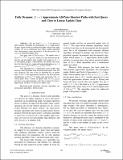Fully dynamic (2 + epsilon) approximate all-pairs shortest paths with fast query and close to linear update time
Author(s)
Bernstein, Aaron
DownloadBernstein-2009-Fully dynamic (2 + ) approximate all-pairs shortest paths with fast query and close to linear update time.pdf (333.4Kb)
PUBLISHER_POLICY
Publisher Policy
Article is made available in accordance with the publisher's policy and may be subject to US copyright law. Please refer to the publisher's site for terms of use.
Terms of use
Metadata
Show full item recordAbstract
For any fixed 1 > [epsilon] > 0 we present a fully dynamic algorithm for maintaining (2 + [epsilon])-approximate all-pairs shortest paths in undirected graphs with positive edge weights. We use a randomized (Las Vegas) update algorithm (but a deterministic query procedure), so the time given is the expected amortized update time. Our query time O(log log log n). The update time is O[over ~](mnO(1/[sqrt](log n)) log (nR)), where R is the ratio between the heaviest and the lightest edge weight in the graph (so R = 1 in unweighted graphs). Unfortunately, the update time does have the drawback of a super-polynomial dependence on e. it grows as (3/[epsilon])[sqrt]log n/log(3/[epsilon]) = n [sqrt]log (3/[epsilon])/log n. Our algorithm has a significantly faster update time than any other algorithm with sub-polynomial query time. For exact distances, the state of the art algorithm has an update time of O[over ~](n[superscript 2]). For approximate distances, the best previous algorithm has a O(kmn[superscript 1/k]) update time and returns (2 k - 1) stretch paths. Thus, it needs an update time of O(m[sqrt](n)) to get close to our approximation, and it has to return O([sqrt](log n)) approximate distances to match our update time.
Date issued
2009-10Department
Massachusetts Institute of Technology. Department of Electrical Engineering and Computer ScienceJournal
50th Annual IEEE Symposium on Foundations of Computer Science, 2009. FOCS '09
Citation
Bernstein, Aaron. “Fully Dynamic (2 + Epsilon) Approximate All-Pairs Shortest Paths with Fast Query and Close to Linear Update Time.” IEEE, 2009. 693–702.
Version: Final published version
Other identifiers
INSPEC Accession Number: 11207109
ISBN
978-1-4244-5116-6
ISSN
0272-5428
Keywords
shortest paths, graph algorithms, dynamic algorithms, approximation algorithms